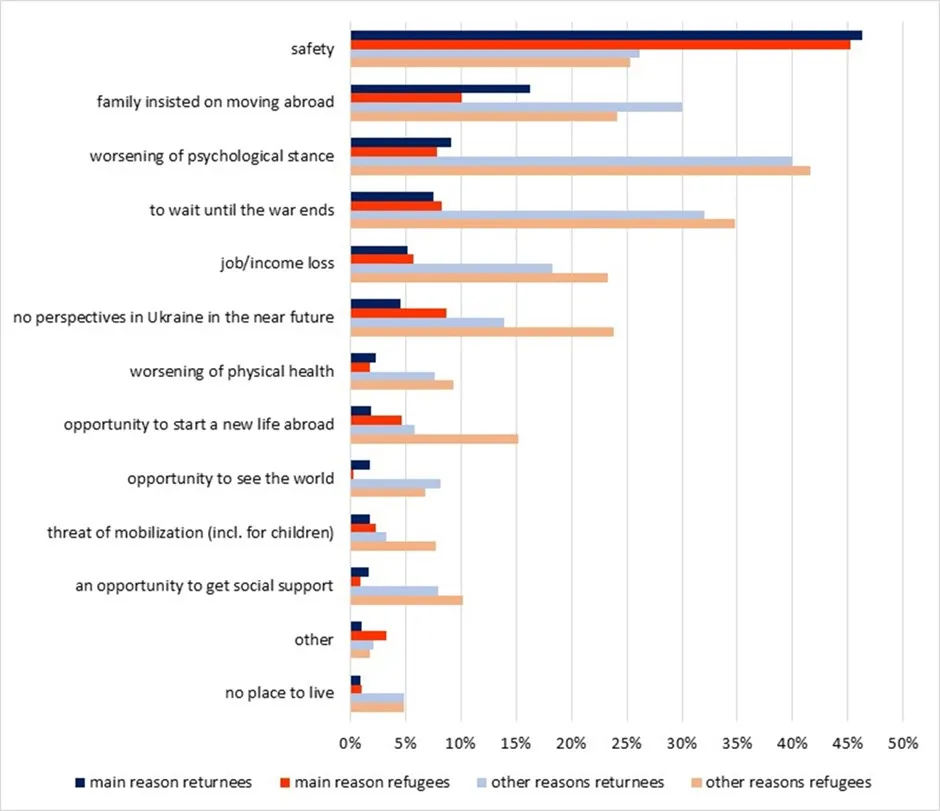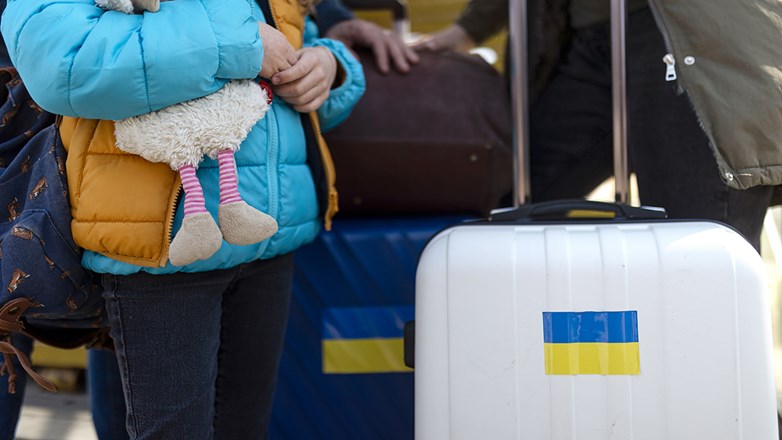Ukrainian refugees: Who returns and why?
Of the 17 million Ukrainians who have fled the country since the full-scale Russian invasion in spring 2022, over 60 percent have returned to the country. Based on survey data of Ukrainians who were previously abroad but have returned and those who have remained abroad, we look at the factors that impact their respective decisions to return or to stay. We find that having family in Ukraine is an important factor, but so is missing one’s home, a wish for children to study in Ukraine and a desire to participate in the reconstruction of Ukraine. People who emigrated with their spouse, and those who had planned to emigrate prior to the full-scale war, are more likely to stay abroad. We also find that those staying in a host country are highly involved in Ukrainian affairs and argue that the Ukrainian government should consider them a resource rather than lost human capital.
One of the major consequences of the Russian war on Ukraine has been the mass exodus of Ukrainians fleeing the war. As of February 2022, the Ukrainian statistical agency has ceased publishing population data for both technical and security reasons, so the exact number of Ukrainians that have left the country is unknown. However, on the basis of mirror statistics from other countries, data from international organizations or surveys, it can be estimated that about 17 million people have fled the country since February 2022. Out of those, over 60 percent have returned to Ukraine, while 6 million Ukrainians have remained abroad.
As people are key in the future reconstruction and development of Ukraine, it is of great importance to understand what factors drive people to return (or not to return) to Ukraine. A recent paper (Sologoub, 2024) aims at addressing this question using a representative survey implemented by the Factum Group in July-August 2023. The survey includes 1400 people who, since early 2022, have fled Ukraine. Half of the respondents had returned to Ukraine at the time of the survey while the other half remained abroad. The first group is from here on referred to as returnees and the latter as refugees.
To look at the factors that determine individual’s decisions to return or stay abroad, the paper specifically considers the factors that impact three probabilities:
- the probability that a person stays abroad;
- the probability that a person who stays abroad plans to return (64 percent of the refugees);
- and the probability that a person who returned plans to stay in Ukraine (56 percent of the returnees).
This policy brief briefly describes the survey data, summarizes the key findings and concludes with policy implications and recommendations.
Main characteristics of the survey respondents
The survey data shows that out of the entire sample of people who have returned to Ukraine and who have remained abroad, over 80 percent are women, and out of these 44 percent emigrated from Ukraine with children. About a quarter of our respondents stay or have stayed in Poland or Germany, 7 percent in the Czech Republic, while other countries have accommodated up to 4 percent of the Ukrainian migrants in our sample. The main reason for emigration is safety – almost half of the respondents reported it being the main reason for leaving Ukraine (see Figure 1).
Figure 1. Stated reasons for migration choices.

Source: Factum Group survey, own calculations. Note: Blue bars are for returnees, orange bars are for refugees (i.e. individuals who have stayed in host country). A dark color denotes the main reason, and a light color denotes other reasons.
Half of the respondents who had a job in Ukraine prior to the war lost their jobs at onset of the full-scale invasion, 18 percent quit their jobs and 30 percent continued to work remotely. 53 percent of the refugees had a job at the time of the survey, and 9 percent of those who remained abroad worked online for a Ukrainian organization. Of those who worked abroad at the time of the survey, 61 percent remained on the same qualification level, while 37 percent changed their qualification level – the majority of those changed to a lower qualification level.
39 percent of all respondents had school-aged children. A quarter of them reported that their children studied only online in Ukrainian schools in 2022/23. Over 60 percent stated that their children studied in a host country, but most of these children took additional classes within the Ukrainian school program – in an online or offline environment, with tutors or on their own.
When asked to compare different aspects of their life abroad and in Ukraine, approximately equal shares of the respondents reported an improvement or a worsening of these aspects. Worsening aspects was mainly reported to concern relations with friends, psychological state, and healthcare. The respondents also stated reasons for their return to Ukraine (or willingness to return), which allowed for estimation of the significance of these reasons. Generally, we found that pull factors (factors attracting people to return to Ukraine) are much more powerful than push factors (factors that force people out of host countries).
Main results from the probability models
Demographic factors (age, education, family status, or income group) are non-significant across all models with the exception of marital status. People who are single are more likely to return to Ukraine, while those who migrated together with their spouse and those who do not have children are more likely to stay abroad.
Significantly positive for the probability that a person had returned at the time of the survey were pull factors such as missing family or home, the wish for children to study in Ukraine, better job opportunities in Ukraine, having property in Ukraine, and returning friends. Some significant push factors were loneliness or integration hardship, as well as feeling humiliated for living on subsidies/state support.
Among respondents who lived abroad at the time of the survey, 64 percent planned to return to Ukraine someday, 13 percent did not plan to return to Ukraine and the rest were undecided. One should however keep in mind that peoples’ intentions can change rather quickly – in the qualitative part of the survey, some respondents explained that their decision to return was spontaneous.
The probability that a person plans to return was lower for people who had planned to emigrate prior to 2022, for people who hadn’t been to Ukraine since they fled, and for people with refugee status (in some countries, people may lose refugee protection status if they exit the host country and travel to Ukraine).
Safety improvements and better job prospects increase the probability that a refugee plans to return, as well as a wish for children to study in Ukraine and a desire to participate in Ukraine’s reconstruction. Over 70 percent of the respondents believe that their experiences from abroad will be useful for the reconstruction and over 50 percent state that the new skills they’ve gained abroad can be applied during the reconstruction of Ukraine.
Significant push factors are lacking integration into the local community and an inferior social life abroad compared to life in Ukraine. Higher levels of general well-being and life satisfaction abroad expectedly reduce the probability that a person plans to return.
Lastly, those who had returned to Ukraine at the time of the survey were asked whether or not they planned to stay in Ukraine. 56 percent said yes, 7 percent plan to emigrate again, while the rest will consider the circumstances. The main factors that keep a person in Ukraine are family, the wish for one’s children to study in Ukraine and a willingness to participate in the reconstruction of the country. Improved safety is also a significant factor – which might explain why people who are originally from the Western part of Ukraine are more likely to stay (the regional factor is significant only in this third probability model). Finally, people who planned to emigrate prior to 2022, or those whose life in Ukraine is considerably inferior to that abroad, are less likely to stay.
Ukrainians’ liaison with their country
60 percent of the refugees read Ukrainian news daily, and over 90 percent read them at least several times a week. The majority of the readers spread these news in their local communities and/or in their social networks. Generally, Ukrainian refugees are quite active, over 40 percent attend rallies in support of Ukraine, almost 40 percent participate in volunteer projects, over 70 percent donate to Ukrainian organizations (and the same share help their relatives in Ukraine) and 15 percent work at a non-governmental organization.
Not surprisingly, the opinion among Ukrainian refugees on reforms in Ukraine is very similar to the opinion among returnees: anti-corruption and judicial reform have the highest priority. In line with this, the fear of corruption derailing the reconstruction of Ukraine is greater than the fear that Russia will continue with their missile attacks on Ukraine. Therefore, the determination of the Ukrainian government to fight corruption will likely not only improve life for people in Ukraine but also increase the probability that refugees return to Ukraine.
Conclusion
Most of the Ukrainians who initially fled the war have already returned to Ukraine, with the majority planning on staying in the country. For those who are still abroad, the majority wish to return when safety improves. When analysing the factors behind such wishes, it is evident that among the pull factors lie not only personal drivers, such as missing one’s home or family, but also civic factors such as a willingness to participate in the reconstruction of Ukraine or a wish for one’s children to study in Ukraine, thus contributing to preserving their identity. Moreover, Ukrainians who are living abroad are highly involved in Ukrainian affairs.
Therefore, we suggest that the Ukrainian government consider refugees as a valuable resource rather than as a loss. For example, government representatives could ask refugees to donate to Ukraine, and engage in individual or collective actions (e.g. inform their local friends about the situation in Ukraine, join rallies or flashmobs in support of Ukraine etc.). Such “people’s diplomacy” is important to ensure continued support for Ukraine.
We also recommend that the governments of host countries make it easier for refugees to stay connected with Ukraine. Specifically, refugees should be allowed to travel to Ukraine without losing their protection status.
Lastly, the strongest precondition for refugees’ return to Ukraine is supplying the country with weapons and other crucial support to win the war. A Ukrainian victory will not only bring about reconstruction and development of Ukraine but also promote and enforce global democracy.
References
Disclaimer: Opinions expressed in events, policy briefs, working papers and other publications are those of the authors and/or speakers; they do not necessarily reflect those of SITE, the FREE Network and its research institutes.
Photo: Halfpoint, Shutterstock




